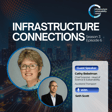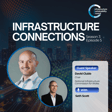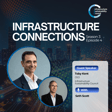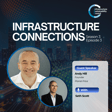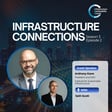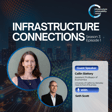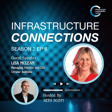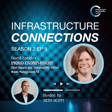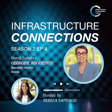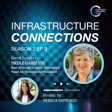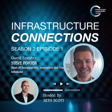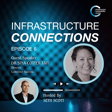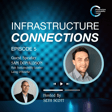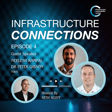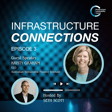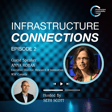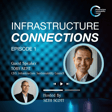
S2E2 - Circular Innovation w/ Veena Sahajwalla
This week on Infrastructure Connections we're talking to Veena Sahajwalla about micro recycling and the circular economy. The takeaways from this episode give us new ways to look at circularity:
1. Companies are starting to re-think their identity. "We're not a waste company, we're a supply company." We supply resources as feedstock, resources that used to be waste for someone else.
2. "If we zoom down to the micro recycling level, every material is important." If it was an important component of the original product, it will be important to recover for the next product.
3. "Sustainability is a normal way to think. The more we can make it a norm, the more we can think of practical ways in which sustainability comes to life."
4. We need to think of sustainability and recycling on a local level, specific to the local industries who need it, and make that recovery a priority. This is compared to the current method of sending our waste overseas and then buying it back as sources.
Veena puts the re in resource.
Veena is the Director of SMaRT Centre (Sustainable Materials Research & Technology) and Associate Dean (Strategic Industry Relations) faculty of Science, University of New South Wales.
Her research interests include sustainability of materials and processes with emphasis on environmental benefits. She invented an environmentally friendly process for recycling plastics and rubber tyres in electric arc furnace steelmaking.
She is an international award winning engineer. In 2012 she was named Overall Winner of the Australian Innovation Challenge Award. She was awarded the 2012 Banksia Award, the GE Eco Innovation Award and the 2005 Eureka Prize for Scientific Research.
We hope you enjoy this episode. From now on we'll be releasing episodes on Thursdays fortnightly.
👉 We'd love to hear your feedback, share your questions or comments below.
👉 Like & Subscribe so you won't miss out on our upcoming episodes!
👉 Keep up to date with the Infrastructure Sustainability Council: Website: https://www.iscouncil.org/ LinkedIn: / infrastructure-sustainability-council
#podcast #infrastructure #sustainability #buildingtomorrow
